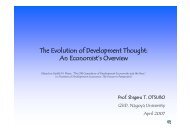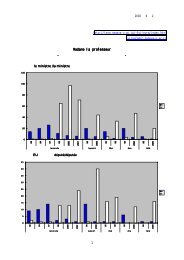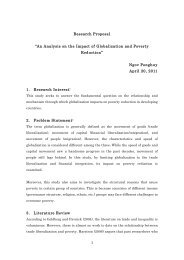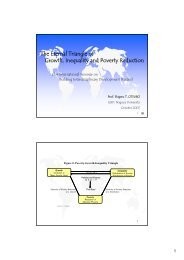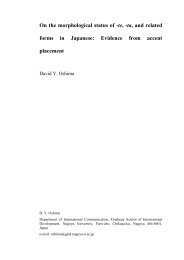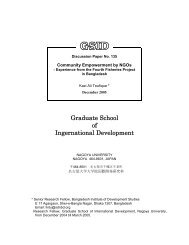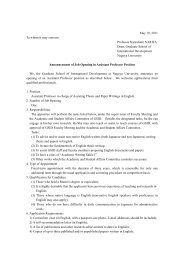Report
Report
Report
You also want an ePaper? Increase the reach of your titles
YUMPU automatically turns print PDFs into web optimized ePapers that Google loves.
P ROSPECTS FOR THE TELECOMMUNICATION SECTOR UNDER SAFTA 167<br />
efficiently functioning telecom market requires appropriate<br />
linking up (‘interconnection’) of the established<br />
and new suppliers, while guarding against anticompetitive<br />
behaviour. A reference paper (RP) (see Appendix<br />
15) was, therefore, prepared which laid down regulatory<br />
disciplines that were considered necessary for<br />
promoting competition in this sector. Adherence to<br />
these principles, however, is voluntary and subject to<br />
whether or not WTO Members inscribed them into<br />
their schedules as additional commitments.<br />
The reference paper has been described as the<br />
touchstone for telecommunications services negotiations<br />
(see Table 15.2). It elucidates principles necessary<br />
for facilitating and sustaining a competitive telecoms<br />
sector, thereby recognising the vital role a competitive<br />
telecom sector plays in its own development as well as<br />
in growth of other sectors that use telecom services as<br />
input in the production process. Liberal telecom regimes<br />
such as those in Western Europe and United States have<br />
fully subscribed to the principles enshrined in the RP.<br />
SAFTA country commitments to the RP, in particular,<br />
and under GATS in telecom in general have both been<br />
modest. This is surprising since the applicable regime<br />
in individual countries in SAFTA is far more liberal<br />
than the commitments made under GATS. The revised<br />
offers, where available also do not bridge this gap. The<br />
reasons are discussed later in this chapter.<br />
The Schedules of Commitment<br />
Article XX of the GATS provides that WTO members<br />
should inscribe their specific commitments in their<br />
Schedules. The Schedules of commitments specify both<br />
the telecommunication service sector (the sub-sector)<br />
in which commitments have been undertaken by a<br />
WTO member, and the nature of these commitments<br />
with respect to market access and national treatment.<br />
These commitments are made separately for each mode<br />
of service supply. In certain cases, members have<br />
undertaken additional commitments (on licensing and<br />
regulatory principles) in their schedule of commitments.<br />
While one schedule specifies the conditions and<br />
qualifications attached to market access and national<br />
treatment by members, another Schedule contains the<br />
MFN exemptions specified by countries.<br />
With respect to market access commitments<br />
inscribed in the schedule, certain types of limitations<br />
(separately for each mode of supply) may be maintained<br />
only if, and to the extent, it is specifically mentioned in<br />
the Schedule. The types of limitations that may be<br />
specified for market access are:<br />
• limitation on the number of suppliers<br />
• limitations on the total value of service transactions<br />
or assets<br />
• limitations on the total number of services operations<br />
or on the total quantity of service output<br />
• limitation on the total number of natural persons<br />
that may be employed<br />
• measures which restrict or require specific types of<br />
legal entity or joint venture limitations on the<br />
participation of foreign capital.<br />
With respect to national treatment for any specified<br />
service, members can specify conditions and qualifications<br />
so as not to give full national treatment. The<br />
exceptions to national treatment can take the form of<br />
different treatment with respect to tax measures, nationality<br />
or residency requirements, licensing standards,<br />
criteria relating to qualifications, and requirements for<br />
obtaining authorisation for providing the service.<br />
Based on an interpretative note issued by the<br />
Chairman of the negotiating group on basic telecom,<br />
an understanding was developed that unless specified,<br />
the scheduled commitments would cover all the relevant<br />
dimensions of basic telecom services in terms of:<br />
• local, long distance and international services<br />
• public and non-public services<br />
• supply on a facilities basis or through resale<br />
• technology-neutrality with respect to supply by<br />
cable, radio, satellites, stationary and nonstationary<br />
means.<br />
As is well known, negotiations are conducted on a<br />
request offer approach, ultimately culminating in<br />
commitments by individual countries. Based on<br />
information available currently, the following members<br />
have submitted 69 initial offers:<br />
Albania; Argentina; Australia; Bahrain; Barbados;<br />
Brazil; Brunei Darussalam; Bulgaria; Canada; Chile;<br />
the People’s Republic of China; Taipei,China;<br />
Colombia; Costa Rica; Croatia; Cuba; Dominica;<br />
Dominican Republic; El Salvador; Egypt; European<br />
Communities and its member states; Fiji; Former<br />
Yugoslav Republic of Macedonia (FYROM); Gabon;<br />
Grenada; Guatemala; Guyana; Honduras; Hong Kong,<br />
China; Iceland; India; Indonesia; Israel; Jamaica; Japan;<br />
Jordan; Kenya; Korea; Liechtenstein; Macao, China;<br />
Malaysia; Mauritius; Mexico; Morocco; New Zealand;<br />
Nicaragua; Norway; Oman; Pakistan; Panama;<br />
Paraguay; Peru; Philippines; Qatar; Saint Kitts and<br />
Nevis; Saint Lucia; Saint Vincent & the Grenadines;




